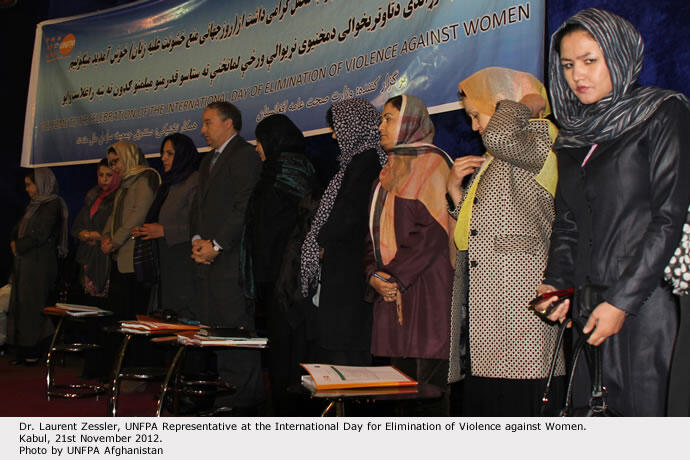"UNFPA enforces zero tolerance for all forms of violence against women and girls and supports the Ministry of Public Health of Afghanistan to ensure that reproductive health rights are granted for all Afghan women as one of the most powerful strategy to eliminate violence against women" said Dr. Laurent Zessler, UNFPA Afghanistan Representative, during the International Day for the Elimination of Violence against Women celebration organized by the Ministry of Public Health of Afghanistan with the support of UNFPA in Kabul on November 21st 2012.
In Afghanistan more than 80 per cent of women experience at least one form of violence in their life time. This is a tragic reality resulting in devastating consequences for the society as a whole. Ms. Mujgan Mustafavi, Deputy Minister of Women Affairs, highlighted the need for a coordinated and political commitment among parliamentarians, members of the government and civil society to eliminate violence against women in Afghanistan.
HE Dr. Suraya Dalil clarified that specific attention is given to victims of gender based violence in the National Priority Program "Health for All Afghans" and MoPH is the first ministry in Afghanistan that established a gender department.
With the ultimate goal to create a safe and non-violent environment for women and girls, UNFPA urge the Government of Afghanistan to build a coordinated multi-sectoral response to gender-based violence by integrating professional assistance and referral services into the health sector.
In Afghanistan healthcare sector has a huge potential of playing a leading role in GBV response due to several cultural and technical factors. Healthcare providers interact with the largest number of women and can be trained to detect and provide assistance to various manifestations of GBV (physical, sexual, psychological). At the same time health facility play a crucial role in evidence collection through the forensic medicine units increasing the possibility to assist GBV victims. Furthermore, it is easier for women to access the health system and already has internal referral network with the system that can be used for referral of GBV survivors.
Afghanistan ratified the UN Convention on the Elimination of all forms of Discrimination against women (CEDAW) in March 2003 as well as other UN Human Rights treaties. UNFPA stand behind to support the government of Afghanistan in full implementation of those Human Rights treaties in the country, enforces zero tolerance for all forms of violence against women and girls and supports the Ministry of Public Health of Afghanistan to ensure that equal rights are granted for all Afghan women as one of the most powerful strategy to eliminate violence against women.
The play on early marriage consequences performed by Afghan actors during the International Day for the Elimination of Violence against Women Celebration was highly appreciated by the heterogeneous and numerous audiences that despite security issues managed to attend the event. In Afghanistan child marriage is a harsh reality for too many young women. More than 46 per cent of Afghan women are married before age 18, according to the Afghanistan Multiple Indicator Cluster Survey 2010/2011, and more than 15 per cent before age 15.


